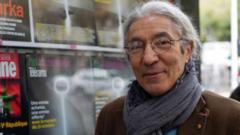Is Algeria's Release of Jailed Novelist the Key to Easing French Diplomatic Tensions?

Published: 2025-11-12 21:00:18 | Category: world
Boualem Sansal, the acclaimed French-Algerian writer, has been granted a presidential pardon by Algeria and is now en route to Germany for medical treatment, marking a significant turning point in the diplomatic tensions between France and Algeria. His release comes almost a year after his arrest at Algiers airport and is largely attributed to the intervention of German President Frank-Walter Steinmeier, who advocated for Sansal’s release on humanitarian grounds due to his advanced age and health issues.
Last updated: 14 October 2023 (BST)
What’s happening now
Following a year marked by diplomatic strife, the Algerian presidency has officially pardoned Boualem Sansal, allowing him to leave the country after nearly a year of confinement. The 81-year-old author, who has been battling prostate cancer, is reportedly travelling on a military plane to Germany for urgent medical treatment. His release has elicited widespread relief from both the literary community and political figures in France, highlighting the intersection of health concerns and international relations.
Key takeaways
- Boualem Sansal has received a presidential pardon from Algeria and is heading to Germany for medical treatment.
- The intervention of German President Frank-Walter Steinmeier was crucial in securing Sansal's release.
- Sansal was sentenced to five years in prison for comments deemed harmful to national unity.
- The diplomatic relationship between Algeria and France remains strained despite this positive development.
- French President Emmanuel Macron expressed gratitude for the humanitarian act by President Tebboune.
Timeline: how we got here
Here is a brief timeline of key events leading up to Sansal's release:
- July 2022: Boualem Sansal is sentenced to five years in prison for undermining national unity in Algeria.
- October 2022: Sansal is arrested upon arrival at Algiers airport.
- April 2023: Diplomatic tensions escalate between Algeria and France over various political issues.
- September 2023: German President Frank-Walter Steinmeier intervenes, advocating for Sansal’s pardon.
- October 2023: Sansal is pardoned and allowed to leave Algeria for medical treatment in Germany.
What’s new vs what’s known
New today/this week
The most significant development this week is the granting of a pardon to Boualem Sansal by Algerian President Abdelmadjid Tebboune, following a direct request from German President Steinmeier. This marks a pivotal moment in the ongoing diplomatic tensions between Algeria and France, particularly given Sansal's status as a prominent critic of the Algerian government.
What was already established
Before this week's events, the relationship between Algeria and France had been deteriorating due to various political and historical grievances, including Algeria's support for the Polisario Front in Western Sahara and recent tensions following the arrest of Algerian consular staff in France. Sansal's imprisonment was viewed as part of a broader crackdown on dissent within Algeria.
Impact for the UK
Consumers and households
While the direct impact on UK consumers and households may be limited, the resolution of this high-profile case could influence perceptions of Algeria in the UK, particularly among those engaged in trade and cultural exchange. The easing of tensions may also foster a more conducive environment for UK businesses looking to engage with Algerian markets.
Businesses and jobs
For businesses, particularly those involved in the cultural or literary sectors, Sansal's release may open up new opportunities for collaboration and exchange with Algeria. However, the underlying tensions between Algeria and France could still pose challenges for UK businesses operating in or with ties to the region.
Policy and regulation
The UK government may monitor the evolving diplomatic landscape between Algeria and France closely, particularly regarding human rights and freedom of expression issues. Changes in Algeria’s political climate could prompt discussions in the UK Parliament about foreign policy and trade relations with Algeria and the broader North African region.
Numbers that matter
- 81: Age of Boualem Sansal, highlighting the humanitarian aspect of his release.
- 5: Years of imprisonment Sansal was sentenced to, a reflection of the severity of the charges against him.
- 1962: Year Algeria gained independence from France, marking over 60 years of complex historical relations.
- 7: Years sentence handed to French sportswriter Christophe Gleizes, underscoring ongoing tensions in freedom of expression.
- 1: The critical role of German President Frank-Walter Steinmeier in advocating for Sansal’s pardon.
Definitions and jargon buster
- Prostate cancer: A form of cancer that occurs in the prostate, a small walnut-shaped gland in men that produces seminal fluid.
- Polisario Front: A national liberation movement aiming to end Moroccan presence in Western Sahara.
- Franco-Algerian migration accord: An agreement established in 1968 that granted residency rights to Algerians in France.
How to think about the next steps
Near term (0–4 weeks)
In the immediate future, observers will watch how the Algerian government handles potential backlash from nationalist factions regarding Sansal’s release. Additionally, the health of Sansal, as he seeks treatment in Germany, will be closely monitored.
Medium term (1–6 months)
Over the coming months, the effectiveness of President Tebboune's decision in easing tensions with France will be evaluated. The diplomatic responses from both Algeria and France will likely shape future interactions.
Signals to watch
- Statements from Algerian and French officials regarding future diplomatic engagements.
- Reactions from the Algerian public and nationalist groups to Sansal's pardon.
- Any changes in the treatment of dissent within Algeria, particularly concerning writers and journalists.
Practical guidance
Do
- Keep informed about developments in Franco-Algerian relations, especially regarding human rights issues.
- Support literary and cultural initiatives that promote dialogue between France and Algeria.
- Engage with organisations advocating for freedom of expression in Algeria.
Don’t
- Ignore the implications of diplomatic tensions on trade and cultural exchange.
- Assume that Sansal's release will lead to a complete thaw in relations between Algeria and France.
- Dismiss the importance of international advocacy on behalf of detained writers and activists.
Checklist
- Stay updated on the health status of Boualem Sansal.
- Monitor how the Algerian government responds to internal dissent post-release.
- Follow international reactions to Sansal's pardon from other governments.
- Evaluate the impact of this incident on Franco-Algerian trade relations.
- Engage with cultural events that highlight Algerian literature and art.
Risks, caveats, and uncertainties
While Sansal's release is a positive development, it remains to be seen how it will affect the broader context of Franco-Algerian relations. The underlying issues surrounding free speech and political dissent in Algeria persist, and future actions by the Algerian government may provoke further tensions. Additionally, the health condition of Sansal is a critical factor to monitor, as it could influence public perception and diplomatic relations.
Bottom line
The pardon granted to Boualem Sansal represents a significant diplomatic victory, particularly for France, and showcases the potential for humanitarian appeals to foster dialogue. However, the complex historical relationship between Algeria and France suggests that while this moment may ease some tensions, deeper issues remain unresolved, and continued vigilance will be necessary.
FAQs
Why was Boualem Sansal arrested?
Boualem Sansal was arrested for undermining national unity in Algeria with his remarks questioning the country’s borders, leading to a five-year prison sentence.
What role did Germany play in Sansal's release?
German President Frank-Walter Steinmeier acted as a trusted third party, advocating for Sansal's pardon on humanitarian grounds due to his age and health condition.
How might this affect Franco-Algerian relations in the future?
While Sansal's release is a positive step, the relationship remains complex and fraught with historical grievances, suggesting that ongoing diplomatic efforts will be essential.



